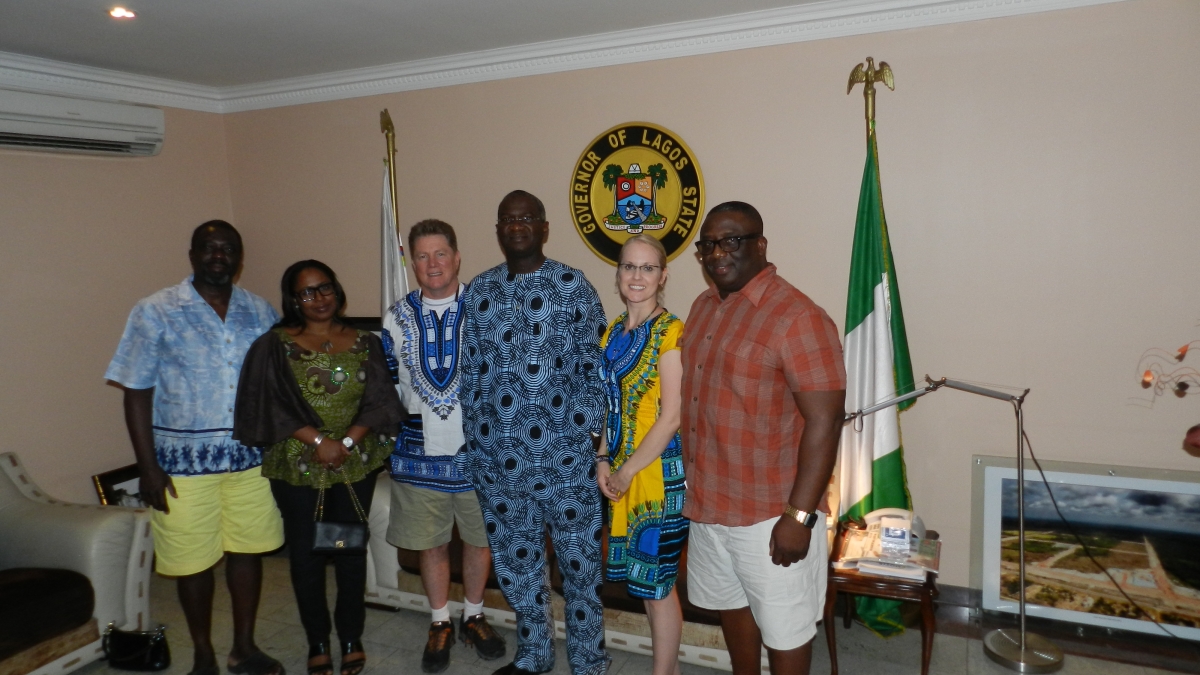ASU assists Nigerian leaders to create sustainability institute in Lagos

One night in early 2013, three childhood friends and prominent community leaders from Nigeria were discussing the current state of their hometown of Lagos. Olasupo Shasore, Olufemi Olarewaju and Adeyemi Adewole wanted to find a solution that would sustain Lagos’ increasing population and infrastructure demands. Specifically, how can Lagos provide for its people amid climate change, population growth and economic inequality? How can it grow in a sustainable manner?
Shasore, Olarewaju and Adewole believed the natural choice was to create a new knowledge center consisting of a school and institute dedicated to teaching and practicing sustainability using project-based learning and real-world experiences that would train the next generation of sustainability leaders.
While conducting research on international sustainability institutions, Olarewaju came across Arizona State University’s Global Institute of Sustainability, the nation’s leader in interdisciplinary sustainability research and home of the School of Sustainability. The three friends used ASU as a basis for the Sustainability School Lagos.
“We have development issues in West Africa,” said Olarewaju, a senior research coordinator at Lagos Island’s Center for Public Policy Alternatives, an independent public policy think tank. “Those interested in attacking these challenges (such as Arizona State University), and leveraging sustainability processes in more developed regions present an excellent opportunity for us to adopt and adapt the lessons they’ve learned over the last decade.”
With an estimated population of 20 million and still climbing, Lagos is one of the planet’s mega-cities. Lagos Island in particular is facing serious development challenges due to population growth, including inadequate power infrastructure, poor sanitation, chaotic transportation, growing slums and a rising sea level.
“Lagos needs an institution that focuses on and provides solutions for the long-term health and vitality of our environment and people,” said Shasore, former attorney general and Commissioner for Justice for Lagos State. “With our projected population increase, rapid urbanization and infrastructure challenges, we need sustainability education and practices that are directly applicable to our local context. Building capacity and resiliency is a vital pathway for our long-term sustainable development needs.”
ASU’s Sustainability Solutions Services, a consulting arm of the Rob and Melani Walton Sustainability Solutions Initiatives, is crafting a design and feasibility study for the Sustainability School Lagos that outlines curriculum, identifies educational needs, pinpoints knowledge gaps, inventories surrounding resources and finds major sustainability themes and transition opportunities.
“Our role is to facilitate an ASU faculty-driven process that defines the kind of institution they want and need in Lagos,” said Dan O’Neill, general manager of the Sustainability Solutions Services. “The Sustainability School Lagos is one catalyst for the revitalization of the city, much like ASU has been a catalyst of Downtown Phoenix’s revitalization.”
Faculty experts from the School of Sustainability advise on solutions-based curriculum and sustainability pedagogy.
“The planet doesn’t just need just our graduates, it needs graduates from all over the world in sustainability,” said Charles Redman, founding director of the School of Sustainability and a faculty adviser for the Sustainability School Lagos. “ASU has the best experience to develop a sustainability institute in Lagos. Sustainability education won’t work with only one institute; there will have to be multiple knowledge centers with diverse pathways to obtain a sustainable future.”
And the Sustainability School Lagos will need leaders. To get a jump start on the process, Olarewaju and Adewole are currently obtaining their Executive Master’s for Sustainability Leadership degrees offered by the Walton Sustainability Solutions Initiatives.
“The Executive Master’s for Sustainability Leadership provides the engagement tools necessary for us to lead our society toward a sustainable development imperative,” said Adewole, owner of Adcem Healthcare, a technology-driven health care delivery company in Lagos. “We are applying the content we learn every day to our efforts to establish a sustainability institute in Lagos.”
The institute is getting noticed in Lagos, particularly by the governor, His Excellency Babatude Fashola SAN, who invited O’Neill, project manager Kristen Osgood, Shasore, Olarewaju and Adewole to present the institute to stakeholders in Nigeria this past January. The governor plans to include the institute in the Lagos central business district’s revitalization.
“The sustainability school will be a vital anchor to revitalize our central business district, as well as provide an education, research and solutions platform to invigorate our growth and development as a city, state and nation,” Fashola said.
The Sustainability School Lagos could become a global model, potentially spreading throughout West Africa and replicated in other regions of the world.
“We’re looking forward to the transformation of Lagos in a sustainable manner,” Adewole said. “We need to be the convergence zone between business and society, using technology to leapfrog issues of development.”
Since their initial trip to Lagos in January, the ASU team has been researching cultural contexts, designing the institution and developing its implementation plan. The team will return to Lagos in mid-May to present their findings to stakeholders, as well as discuss a variety of project possibilities that could be incorporated into the education and solutions process. The Sustainability School Lagos is planned to launch in the second half of 2014.
“Our goal is to help the government and business leaders of Lagos realize their dreams to become more sustainable,” said O’Neill. “We want to build a long-lasting partnership in which ASU faculty and students can participate in building a more sustainable West Africa.”